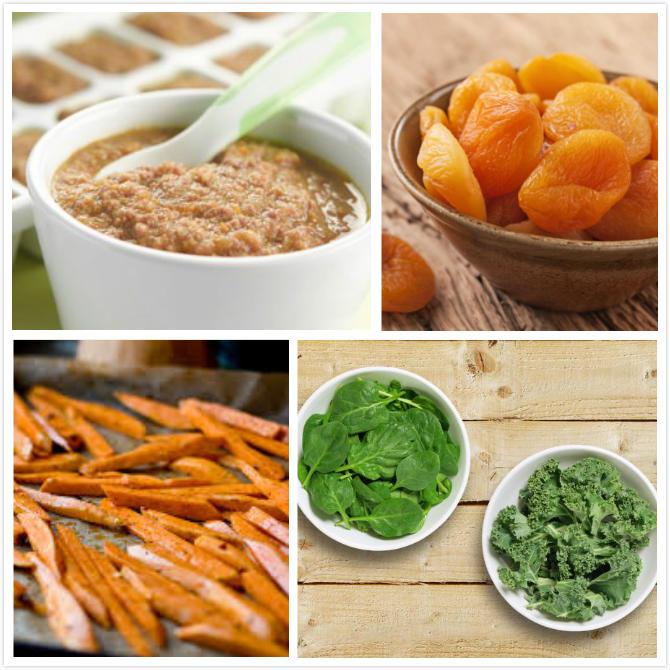 Proper nutrition is imperative in growing children to ensure optimum growth and development at every stage. There are so many specific nutrients that are important in the development of young children. One such important mineral is iron in the child’s diet. Many children worldwide are diagnosed with an iron deficiency, which can have long-term repercussions for the child’s health and development. Some baby formulas and cereals have added iron but this hasn’t succeeded in fully reducing iron deficiency in babies.
Proper nutrition is imperative in growing children to ensure optimum growth and development at every stage. There are so many specific nutrients that are important in the development of young children. One such important mineral is iron in the child’s diet. Many children worldwide are diagnosed with an iron deficiency, which can have long-term repercussions for the child’s health and development. Some baby formulas and cereals have added iron but this hasn’t succeeded in fully reducing iron deficiency in babies.
Nine Iron Rich Foods for Babies
1. Red Meat
This includes food like beef, lamb, liver, pork and dark poultry meat. These foods are rich in iron in a form that is easily absorbed by the body. You can make lean ground beef puree with certain amount of tomato sauce that is also rich in vitamin C.
2. Green, Leafy Vegetables
They provide sufficient iron and also fiber, calcium and vitamin C. Examples are: spinach and kale. You can prepare some veggie puree for your baby.
3. Walnuts
This type of nut is not only rich in iron but full of omega-3, which is important for a healthy heart. Walnuts are also a great source of protein and healthy fats.
4. Sweet Potatoes
They are great vegetarian foods for getting your daily iron requirement. Sweet potato fries are a great way to incorporate this vegetable into your child’s meal when he or she has some teeth.
5. Eggs
The yolk of the egg is one of the iron rich foods for babies. There has recently been a change to the recommended age at which you can first introduce eggs to infants. Previously, it used to be after the age of one, to prevent any allergies. Now babies are encouraged to eat eggs as soon as they begin on solid food. There have been studies done to back this new recommendation.
6. Dried Fruits
Dried fruits like prunes, apricots, dates and raisins are high in iron and are great snack foods for your child to eat. Incorporate these fruits into the child’s breakfast or into some healthy baked goods.
7. Seafood
Seafood like tuna and shrimp are high in iron. Shrimp can be added as a finger food that can be eaten with a dip. Or use the seafood as an ingredient in a pasta dish.
8. Tofu
Tofu can be cut into bite-sized pieces and given to the child as a finger food. It is an appropriate source of iron for vegetarians.
9. Quinoa
Quinoa is one of the vegetarian iron rich foods for babies. This seed has recently been recognized and revived as a healthy food. Add this nutty-flavored seed to soups and salads or substitute it in place of rice.
How Much Iron Does Your Baby Need?
New-born babies are born with a reserve of iron that is derived from the mother’s blood in the womb. As the babies grow, their iron requirements vary.
During the first six months after birth, a baby’s iron requirements are met from the breast milk, if they’re being breastfed. Breast milk contains vitamin C as well to maximize the absorption of iron. If the baby is being formula-fed, then chose an iron-fortified brand.
In the first year of life, healthy babies require about 11mg of iron daily. This level decreases to about 7 mg between the ages of 1 and 3. Between the ages of 4 and 8, the daily requirement increases to about 10 mg. 8 mg is the daily iron requirement for children between the ages of 9 and 13. Once the growth spurt of puberty hits, the requirements jump to 11 mg for boys and 15 mg for girls.
Does My Baby Have Enough Iron?
Although you’ve prepared enough iron rich foods for babies, it’s still possible that your baby has anemia. There are a few signs present in children who have an iron deficiency:
- They exhibit a slower than normal weight gain.
- The skin is typically pale in babies with anemia.
- They refuse to eat and have no appetite.
- They are fussy and cranky more than the typical toddler.
- They are less physically active than normal children at that age.
Should an Iron Supplement Be Introduced?
Be sure to consult with the baby’s doctor before you start any iron supplementation. Iron tends to build up and it is possible to have too much iron in the body. Also, a baby’s bodily systems are not mature enough to handle large doses of this mineral.
- Usually healthy, full-term babies get enough iron either from the breast milk or fortified formula. These children do not require any extra iron.
- Some pre-term babies are prescribed an iron supplement from 8 weeks old up to 1 year. Make sure you consult with the pediatrician about the correct dosage.
- Healthy toddlers older than 1 year usually don’t require extra iron unless there is a specific deficiency diagnosed by the doctor.
